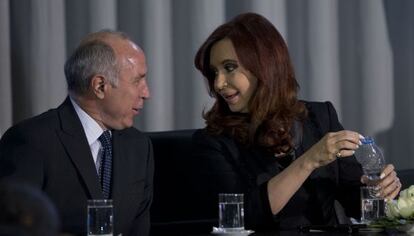Reform of judiciary in Argentina seen as presidential weapon
Fernández de Kirchner's measures include direct election of judges and new appeals courts

While a continued public battle between the government and members of the judiciary plays out in her country, Argentinean President Cristina Fernández de Kirchner on Monday filed six bills in Congress aimed at “democratizing” the judicial branch.
The package of measures calls for the direct public election of judges and members of Argentina’s legal watchdog, the Magistrates Council; imposing time limits on court injunctions against the state; the establishment of an entrance examinations for all judicial candidates; and the creation of three appeals courts.
During a ceremony at the Bicentennial Museum in Buenos Aires, Fernández de Kirchner explained that the reforms would help to “modernize” Argentina’s judiciary for the 21st century.
The opposition boycotted the presentation but Supreme Court Chief Justice Ricardo Lorenzetti attended. The president had announced her proposals on March 1 in Congress. Fernández de Kirchner’s Peronist faction and her allies control both chambers of Congress so passage of this controversial restructuring is likely.
“This will give citizens participation in such a way that judges, as well as lawyers and legal experts on the Magistrates Council, will be elected on the basis of article 38 of the national Constitution, which states that political parties are the only road for exercising democracy,” she said. “This isn’t a polarization of justice.”
Currently, the Magistrates Council is made up of three judges elected among its members, three senators and three deputies appointed by Congress, two lawyers nominated by bar associations, a government representative and an academic selected by the National Inter-University Council.
Under the president’s bill, the number of council members will grow from 13 to 19. The six new members — who will be judges, lawyers and academics — will be elected by popular vote during the legislative races in August.
Mario Barletta, the head of the largest opposition party, the Radicals (UCR), said that the reforms that affect the Magistrates Council are “particularly worrisome.”
“The measures announced to democratize justice have nothing to do with improving the system and bringing people closer to the judiciary,” Barletta told a radio station.
The reforms come on the heels of Fernández de Kirchner’s public battle with the judiciary over her government’s anti-monopoly communications law, which many critics claim is aimed solely at breaking up the Clarín media group, which has been critical of her administration. The courts have sided with Clarín on several occasions and have ordered suspensions in applying the law until legal arguments are resolved.







































